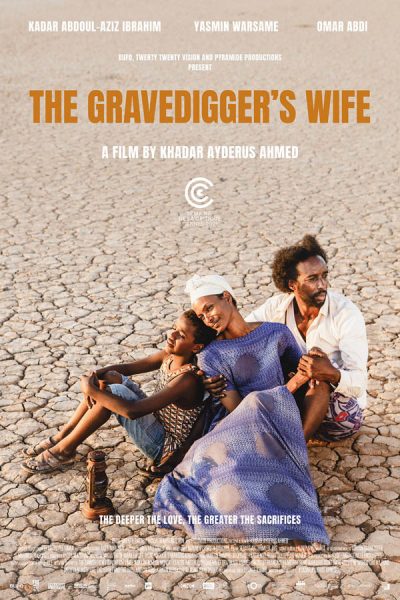
“The Gravedigger’s Wife” (“Guled and Nasra”) (2021). Cast: Omar Abdi, Yasmin Warsame, Kader Abdoul-Aziz Ibrahim, Samaleh Ali Obsieh, Hamdi Ahmed Omar, Awa Ali Noor, Fardouza Moussa Egueh, Saharia Ahmed Moussein. Director: Khadar Ahmed. Screenplay: Khadar Ahmed. Web site. Trailer.
What lengths would you go to for the one you love? When adverse situations arise, we can be left with difficult choices, the kind that frequently leave us between a rock and a hard place. No matter how much we care for a loved one, circumstances may thrust us into a position where Herculean efforts – with no guarantee of success – are often foisted upon us. And, if we do nothing, the outcome can be tragic, leaving us devastated. So what are we to do? That’s the core question raised in the new Somalian domestic drama, “The Gravedigger’s Wife” (“Guled and Nasra”).
Djibouti gravedigger Guled (Omar Abdi) struggles to make ends meet to keep his family together. His meager earnings are barely enough to stay afloat, yet that doesn’t stop him from seeking out sources of additional income. In fact, during times of no work, he and his colleagues park themselves outside a hospital emergency room, hoping that arriving ambulances will provide them with new money-making opportunities – patients who are near death or have already passed on and in need of burial. As morbidly opportunistic as that may sound, though, it still doesn’t provide the financial resources he needs.
In large part, that’s due to the fact that Guled is spending nearly every penny he earns on medication for his wife, Nasra (Yasmin Warsame), who’s suffering from chronic, debilitating kidney disease. Guled positively adores Nasra and is willing to go to almost any lengths for her, but, no matter how much he does, it never seems to be enough. It’s put quite a strain on the household, particularly in his relationship with his teenage son, Mahad (Kader Abdoul-Aziz Ibrahim), who is growing progressively rebellious and increasingly hard to control. But, what’s worse, Nasra’s condition appears to be worsening, making matters even more difficult.
After visiting the hospital – this time not in search of work opportunities – Nasra’s attending physician (Fardouza Moussa Egueh) informs her and Guled that she requires life-saving surgery, a procedure that has good prospects for restoring her health but that is exorbitantly expensive. Guled doesn’t have nearly enough money for the operation, a prospect that essentially constitutes a death sentence for Nasra if he’s unable to raise the funds in time. But where will he get the cash he needs?
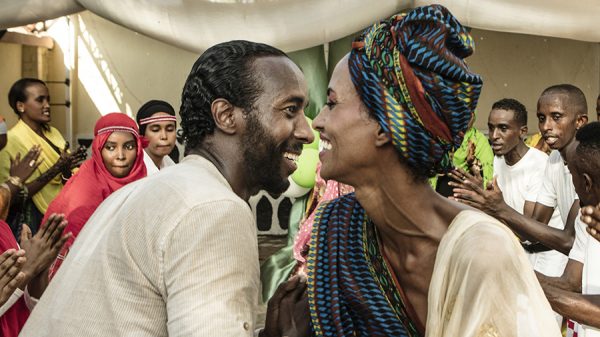
After assessing the situation, Guled realizes there’s only one option, and it’s far from easy. An income source is potentially available, but it will require him to return to the rural village where he grew up, a place he left many years earlier after a difficult and painful falling out with his family. Yet, given that this appears to be his only choice, he knows that he will need to make the long journey – on foot through the heat and rough terrain of the African wilderness – to his family homestead to collect what he believes he’s entitled to.
As the details of Guled’s past emerge, it also becomes apparent that there’s no guarantee that he’ll be able to collect on what he’s owed, especially when family members try to stonewall his attempts at staking his claim. Circumstances become even more complicated when his village’s tribal leaders become involved in the fray, implementing community proceedings to resolve the dispute between Guled and his relatives.
Given Guled’s depleted state after the long journey and his desperation to acquire the resources needed to save his wife’s life, it’s an ordeal that weighs heavily upon him. The anguish and frustration are unbearable, particularly in light of the intractable position assumed by his family, Nasra’s condition notwithstanding. He appears to be saddled with an impossible situation, one in which his own well-being is also now at stake. How will he be able to survive and save Nasra’s life? That’s what remains to be seen as this heartbreaking story unfolds.
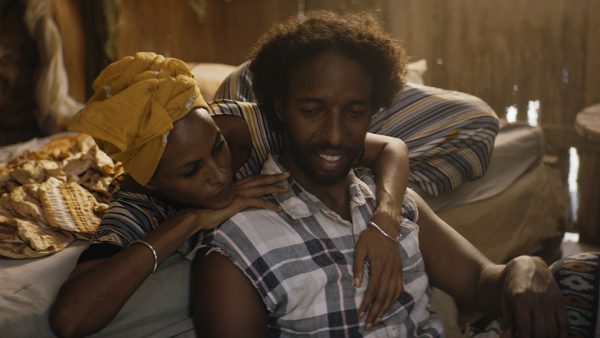
It’s been said that, when there’s a will, there’s a way, even if its implementation and execution are difficult, if not seemingly impossible. The key to making it work rests with one’s ability to believe in the manifestation of the possibility, which is where the notion’s likelihood often comes under challenge. However, if one has faith in the idea and a commitment to make it happen, the chances of its materialization increase significantly.
These are the conditions that Guled faces when it comes to devising and enacting a solution to the dilemma he faces. His success will ultimately depend on his ability to tap into the foregoing principles, concepts that form the basis of the conscious creation process, the philosophy that maintains we draw upon our thoughts, beliefs and intents in manifesting the existence we experience. Guled may not have heard of this school of thought, but that doesn’t mean he can’t exercise its fundamentals in coming up with a plan to save Nasra before it’s too late. The question is, how committed is he to making it work?
Guled has a powerful tool at his disposal in attempting to pull off such a scenario – his love for his wife. His profound feelings in this regard are rooted in beliefs directly associated with his commitment to her and the relationship they’ve built together. His love is so deep that he can barely imagine a life without her. And that kind of devotion is a formidable motivation for launching, carrying out and completing the plan, no matter how arduous it might seem.
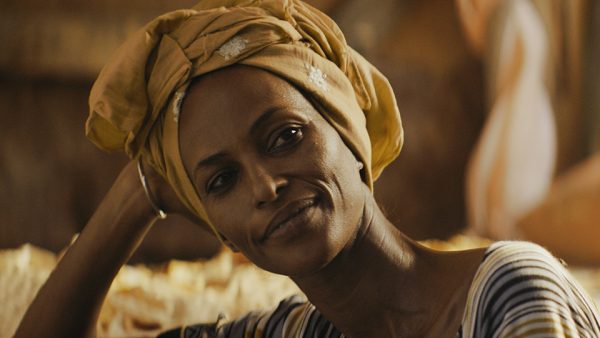
To be sure, an undertaking like this would almost assuredly deplete anyone’s wherewithal and resources, and Guled is no exception. At some point, though, he must choose whether the effort he needs to expend is worth it. Considering his bond with Nasra, his decision should be obvious. Admittedly it’s a hard choice, but, for those we love as much as Guled loves Nasra, there’s really no other option.
In taking on this venture, there are undoubtedly limitations and obstacles standing in Guled’s way. But, if he’s to achieve his goal, he must believe that they can be effectively overcome. That’s a tall order, to be sure, especially if fears and doubts enter the picture, for, at their core, they’re beliefs that can undermine whatever he attempts, potentially derailing his plans before they ever get off the ground. Consequently, he must set them aside and embrace beliefs related to attaining success and living courageously. That may also be a tall order, but employing those notions is indeed possible with the right mix of faith, commitment and determination, despite the odds.
Carrying out such manifestation efforts can be significantly enhanced with the right motivations. As previously mentioned, Guled’s love for Nasra is already in place, and that, in itself, is a force to be reckoned with. But there are other tools that can be employed, such as the power of compassion, which can infuse an undertaking like this with tremendous fortitude. Then there’s the impact of gratitude, the appreciation that Guled has for the presence of Nasra in his life, an influence that can significantly drive his determination, inspiration and enthusiasm. With all of that backing his efforts, he has an impressive and powerful belief toolkit at his disposal to realize his objective.
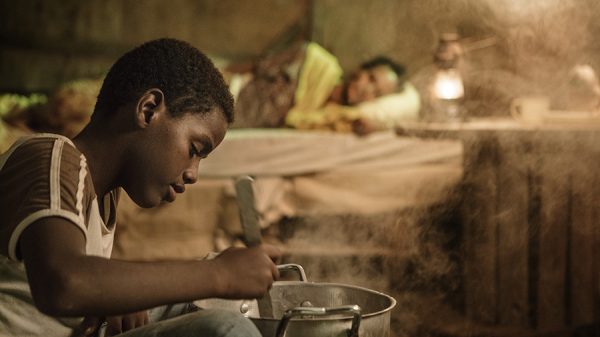
Tales like this are truly uplifting. In an age where it has become all too easy to throw in the towel, it’s heartening to witness stories where individuals are willing to place everything on the line to see their aspirations and ambitions fulfilled. Guled sets quite an example given what he undertakes in the name of love, and what greater glory could there be than that?
Writer-director Khadar Ahmed’s debut feature presents a simple but decidedly heartrending and heartbreaking tale, one that certainly tugs at the emotions as the couple’s story plays out, thanks in large part to the excellent performances of Abdi and Warsame, who have a tremendous chemistry on screen. To be sure, the film has its predictable moments and a few story threads that aren’t as fully developed as they could have been, but, overall, this is a fine showcase for a superb emerging talent, one who shows tremendous promise for future projects.
Unfortunately, finding “The Gravedigger’s Wife” may take some effort. It was highly touted as a strong contender at the start of the 2021 movie awards season, receiving considerable acclaim from critics and at film festivals, such as the Cannes Film Festival, where it earned nominations for the Golden Camera and Critics’ Week Grand Prize Awards. However, for whatever reason, those accolades did not translate into significant competition nominations, falling short of many expectations, despite its many laurels. The film has primarily been playing the festival circuit, which is probably the best place to find it, at least for the time being. The picture deserves a shot at general distribution, and here’s hoping that it gets that chance.
It’s been said that love conquers all, and I’m sure many of us would like to hope that’s true. That doesn’t mean, however, that it won’t get put to the test from time to time to verify its strength and resiliency. Such tests can be frustrating, but they can also help to bolster the bonds with our loved ones, taking that love to a deeper level. The choices involved in reaching that point may be difficult ones, but, in the end, we’ll likely find that the effort was worth it, something for which we can be eternally grateful.
Copyright © 2021-2022, by Brent Marchant. All rights reserved.

No comments:
Post a Comment